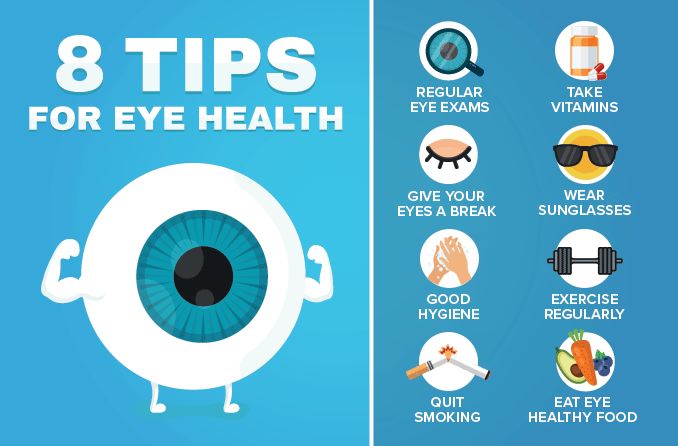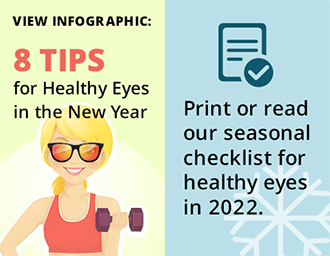8 tips for healthy eyes: Look, see and feel better
- Tips to improve your eye health
- Tip #1: Eat eye-healthy foods
- Tip #2: Take vitamins for eye health
- Tip #3: Protect your eyes from the sun
- Tip #4: Give your eyes a break
- Tip #5: Nix nicotine (and other unhealthy habits)
- Tip #6: Get plenty of exercise for eye health
- Tip #7: Practice good eye hygiene
- Tip #8: Get your eyes checked regularly

Tips to improve your eye health
Eye conditions and diseases — from cataracts to eye injuries to myopia — affect the lives of millions of U.S. adults each year. But if you take steps to maintain your eye health, you can keep your vision sharp, lower your risk of eye disease and protect your eyes from hazards.
Want to make eye health a priority this year? Grab our handy eye health and vision checklist and follow these eight eye health habits to protect your vision in all stages of your life.
Tip #1: Eat eye-healthy foods
Eating a healthy diet is one of the best steps you can take toward good eye health. Start by choosing foods that can improve your eye health. Your best options include:
Colorful fruits and vegetables – Eat dark green leafy vegetables like chard and kale, which may help to prevent age-related macular degeneration (AMD), the top cause of irreversible vision loss in older adults. And be sure to include orange and yellow fruits and vegetables like carrots, cantaloupe and sweet potatoes. They contain vitamin A, which helps protect the corneas and acts as a key to good vision.
Beans and other legumes – One eye health benefit of black-eyed peas, garbanzos and other beans is that they contain a variety of nutrients, including: B vitamins, calcium, folate, iron, potassium and zinc. And beans and legumes are rich in fiber, which can help you feel full on fewer calories.
Healthy fats – Make canola oil, walnuts and fish with omega-3 essential fatty acids a regular part of your diet. These healthy fats may help prevent common eye problems such as cataracts and dry eyes.
Whole grains and cereals – Reach for 100% wholegrain breads and cereals instead of white bread and refined grains. Examples of healthy whole grains include amaranth, barley, farro, oats and quinoa.
Making your grocery list with eye health in mind can help keep your vision sharp and boost your overall health too.
Tip #2: Take vitamins for eye health
Eating a healthy diet is great, but taking vitamins for eye health can help you make sure you're not lacking important nutrients. Here are some eye health supplements you may want to consider taking:
Copper – 2 mg a day
Omega-3 fatty acids – 2,000 mg a day
Vitamin B complex – Look for one with at least 400 mcg of folic acid
Vitamin C – 250 mg to 500 mg a day
Vitamin E – 400 IU a day
Other great supplements for eye health are:
Flaxseed oil – Especially if you don't eat fish
Zinc
While you don't need to take vitamins for eye health, several studies have found possible benefits to certain eye health supplements, such as reducing the risk of cataracts.
Tip #3: Protect your eyes from the sun
Shielding your eyes from the sun's UV rays can help protect your vision and prevent skin cancer from developing around your eyes. Sun damage can lead to numerous eye conditions, including cataracts, macular degeneration and photokeratitis.
To protect your eyes from the sun (and the delicate skin around them), you should:
Wear good sunglasses – Invest in a pair of high-quality sunglasses to protect your eyes from the sun. Look for 100% UV protection and consider getting a pair with oversized lenses to cover more of your face.
Use sunscreen every day – Protect yourself with a broad-spectrum sunscreen of at least 30 SPF. If you're worried about sunscreen burning your eyes, choose a sunscreen that uses minerals rather than chemicals to block the sun.
Grab a hat for extra protection – Add a floppy hat with a wide brim for additional sun protection for your eyes and face.
Using multiple layers of sun protection is a bright idea for the health of your skin and eyes.
Tip #4: Give your eyes a break
Most people spend a lot of time staring at screens on computers, smartphones and TVs. This can lead to digital eye strain, which can cause blurry vision, dry eyes, eye fatigue, red eyes and even eye twitching.
To prevent digital eye strain, be proactive about giving your eyes regular rests from the screen. Here's how you can give your eyes a break:
Blink more often – Just getting into the habit of blinking more frequently can help to prevent dry eyes.
Use the 20-20-20 rule – Every 20 minutes, look away from the screen and gaze at an object at least 20 feet away for 20 seconds.
Take hourly breaks – Try to take a 10-minute break for every hour you spend looking at a screen. During the break, get up, stretch and walk around.
Spend time outside – Doing things outside that don't require near vision can also be a good way to rest your eyes.
You might also want to consider getting a pair of computer glasses to help reduce symptoms of digital eye strain.
Tip #5: Nix nicotine (and other unhealthy habits)
Taking positive steps to protect your eye health is a great move, and getting rid of unhealthy habits may be just as important.
If you smoke tobacco, quitting cigarettes (or cigars or pipes) is one of the best things you can do for your eyes. Smoking can worsen dry eyes and may put you at a higher risk of developing cataracts, macular degeneration, diabetic retinopathy, optic nerve problems and uveitis, an inflammation of the middle layer of the eye.
Get tips for quitting smoking at smokefree.gov, where you can create a quitting plan and find tools like apps and texting programs to help you quit smoking.
Also ditch other habits that may be hazardous to your eye health, like working around flying branches and debris without wearing safety goggles. More than 125,000 U.S. residents get an eye injury at home each year, so wearing eye protection is one of the most important ways to safeguard your vision.
Tip #6: Get plenty of exercise for eye health
Regular exercise is important for your overall health and also for your eyes. Exercise can help prevent or control a variety of conditions that can lead to eye problems, including diabetes and high cholesterol. Research has found that regular exercise can help delay or prevent age-related macular degeneration (AMD). This study and others like it suggest that working out may also help prevent the onset of glaucoma and diabetic retinopathy.
But don't worry: You don't need to sign up for a marathon to keep your eyes in good shape. Exercising moderately for 30 minutes a day, five days a week should do the trick. Choose any activity you like that gets your heart rate up, from biking or dancing to jogging, swimming or walking.
READ MORE: Celebrate Healthy Vision Month
Tip #7: Practice good eye hygiene
Good eye hygiene can help prevent eye infections, which are a major threat to eye health. Every year in the United States, about 1 million eye infections send patients to the doctor or hospital for treatment.
To avoid common eye infections like styes and pink eye, follow these eye hygiene tips:
Don't touch your face or rub your eyes — this can harm your eyes and is bad for eye health anyway.
Wash your hands with soap for at least 20 seconds regularly, especially after a trip to the bathroom or grocery store.
If you wear contacts, practice proper contact lens care, cleaning and disinfection.
These simple steps can greatly reduce your chances of getting an eye infection.
Tip #8: Get your eyes checked regularly
Make sure you get regular comprehensive eye exams. Adults ages 18 to 64 should get an eye exam at least once every two years, and older adults (age 65 and up) should get an eye exam every year. Adults who are at higher risk for eye disease — for example, those with diabetes, high blood pressure or a family history of glaucoma — may need exams more frequently.
Regular eye exams are important because they allow your eye doctor to check your eye health and visual acuity. They can also reveal a lot about your overall health, sometimes making early detection possible for diabetes, high blood pressure, high cholesterol and other serious conditions.
To begin your journey toward better eye health, put your sunglasses by the door (or in your car) and schedule your next eye exam. Then build on those steps by continuously adding new healthy eye habits to your daily life.
READ NEXT: How often should you get your eyes checked?
Healthy food trends - beans and legumes. MedlinePlus. May 2020.
Whole grains A to Z. The Whole Grains Council. Accessed January 2022.
Sunscreen FAQs. American Academy of Dermatology Association. Accessed January 2022.
Smoking and eye disease. American Academy of Ophthalmology. January 2020.
Tools & tips. Smokefree.gov. Accessed January 2022.
Exercise may stave off eye disease, study finds. American Academy of Ophthalmology. October 2020.
Voluntary exercise suppresses choroidal neovascularization in mice. Investigative Ophthalmology & Visual Science. May 2020.
Page published on Wednesday, February 9, 2022
Medically reviewed on Monday, January 24, 2022







